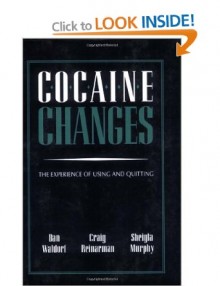 For a period of four years from 15th November 2004, I wrote a series of Background Briefings for Drink and Drugs News (DDN), the leading UK magazine focused on drug and alcohol treatment. I am slowly uploading these briefings on Recovery Stories as I have time.
For a period of four years from 15th November 2004, I wrote a series of Background Briefings for Drink and Drugs News (DDN), the leading UK magazine focused on drug and alcohol treatment. I am slowly uploading these briefings on Recovery Stories as I have time.
Three of these briefings are focused on cocaine—The Drug Experience: Cocaine. In the first part, I explore the dynamic world of heavy cocaine use as revealed in a provocative, high-quality study by Dan Waldorf and colleagues. This research, conducted in the US in the 1980s, challenged many of the prevailing myths about cocaine.
In the second part, I point out that while cocaine is generally portrayed as having a very high addiction potential, the majority of people who use the drug do not have a problem. The research by Dan Waldorf and colleagues reveals a number of social and social psychological factors that influence how a person uses a drug.



